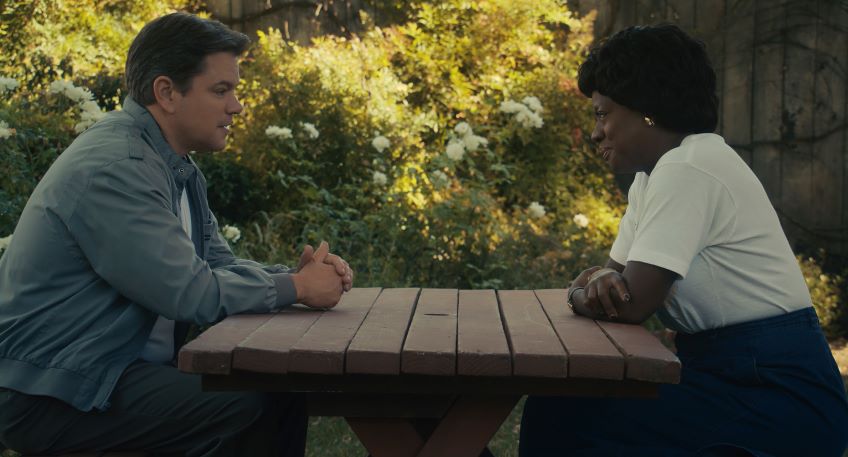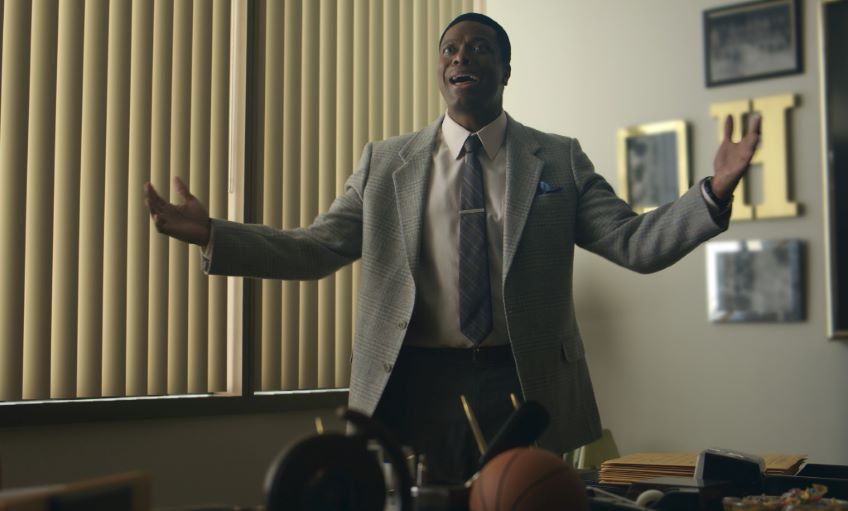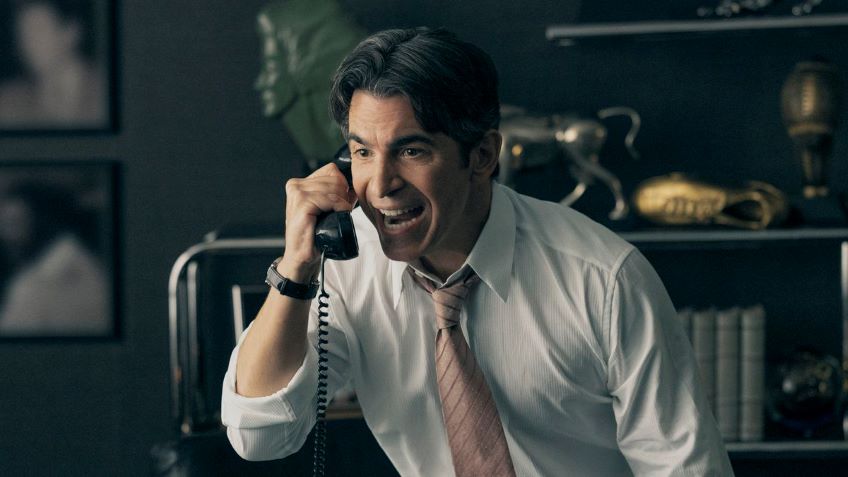Joyce Glasser reviews Air (April 5, 2023) Cert 15, 112 mins.
Nike (with revenues of $46 billion) as a renegade company and an underdog compared to Converse and Adidas? Yup. Air is historical non-fiction, and for those who like American Dream stories, knowing the outcome is half the fun. Go see Air for the magical reunion of director Ben Affleck (Argo, Gone Baby Gone) who plays Nike’s CEO, and Matt Damon (The Martian, the Bourne series, The Talented Mr Ripley, The Departed) who plays Nike Basketball Talent Manager Sonny Vaccaro, because the chemistry between the two friends from Good Will Hunting 25 years ago is stronger than ever.
Sonny plays the underdog who snatches rising star Michael Jordan from the competition and changes sport forever in a risky marketing deal. Those who saw the documentary One Man and his Shoes will be less likely to punch the air when the staggering sums of money the deal produced are flashed across the screen.
It’s easy to forget that Air is pure entertainment and even makes working for a big corporation look like fun. The feelgood script by Alex Convery (in his first produced screenplay) gives plenty of scope for a great supporting cast to shine in rich characterisations. At the top of the stellar list is Viola Davis as Jordan’s sharp mother, Deloris, the quiet woman who listens well and drives a hard bargain, confident in her son’s worth. Davis never heard of Deloris before reading the script but was attracted to the mind of this woman who thought to negotiate a percentage of revenues clause in her son’s contract that changed the company/talent relationship forever.

The first challenge for audiences is to imagine the time, back in 1984, when Nike is the underdog – at least in Basketball shoe sales, with a mere 17% of the market. Nike is known for running, but that doesn’t help hard working marketing executive Sonny Vaccaro (Damon) whose job is to find players to represent Nike’s shoes.
Nike co-founder Phil Knight (Affleck) who began the dressed down business dress code that Nike Clothing continued, is a runner himself and is wary about giving in to his long-time colleague’s plan to use the entire Basketball Talent budget to hire one player, not three. Howard White (Chris Tucker) the injured NBA champion player who now wears a three-piece suit as VP of Nike supports Sonny, but the move is risky. Marketing VP Rob Strasser (Jason Bateman) pressures Sonny to stop nixing players proposed by others and propose three – not one – that he supports.
After analysing tapes of his games and the way the other players play around him on the court, Sonny sees Michael Jordan’s exceptional talent. The trouble is Jordan wears Converse sneakers after games and Adidas during them. And his caustic manager, David Falk (Chris Messina, hilariously rude) fobs off Sonny and Nike, hidden away in Oregon, saying Jordan has been offered $250,000 (Nike’s entire Talent budget) plus an expensive car. Jordan refuses to talk to Nike and Falk warns him to stay away from the Jordan’s home (where Michael often resides).
Sonny does his homework, consulting with George Raveling (Marlon Wayans) both Jordan’s and the US Olympic Team coach, who wants to help Sonny whose allegiances are divided. Chris Tucker is a friend of the 85-year-old Raveling and was able to feed his knowledge of the man into Wayans small, but significant scene.
Raveling’s Martin Luther King story is not extraneous to the theme of the film but brings the issue of race to the core. Jordan is a black player demanding a percentage of revenues for each pair of Air Jordans sold from a white company listed on the stock exchange. Serving as a security guard on the podium during the famous “I have a dream” speech, Raveling was given the original draft of King’s speech – which he changed last minute. He tells Sonny he has refused $3 million for it.
We see how Sonny, who lives alone, eats junk food, and tries without success to jog, goes about defying the rules and winning over Michael’s astute mother Deloris, infuriating Falk by paying a visit to her home. He paints a picture of the opposition that she (and the audience) sees materialise as she methodically visits each bidding company with Michael’s face shown only in profile or from the back.

Adidas is a hot company that Jordan favours. Sonny points out that its management is conflicted and the decision making inconsistent. Converse has Magic Johnson and Larry Bird and Michael would always be in the shadow of these two giants. Nike, however, are going to centre their whole campaign around Michael and create a shoe just for him. It will even be named after him. What mother can refuse?
The creation of the shoe is given pride of place with Peter Moore playing the Creative Director Matthew Maher who conceives the red and white Air Jordan while skateboarding his way through a mid-life crisis. Having managed to persuade Phil to gamble the talent budget on Jordan, Sonny doesn’t bother to mention that Nike will agree to pay all the fines each time Michael wears the colourful shoe (which is against NBA regulations). The shoe starts to represent defiance – and cool.
Several scenes, including the big Nike/Jordan meeting, with Phil’s hilariously executed strategic late entrance, shows the influence of Aaron Sorkin but the general tone allows for more of a varied pace and warmth than in Sorkin’s films. It’s a believable scene with banal, bravura and awkward moments, salvaged by Sonny’s impromptu speech “a shoe is just a shoe until someone steps in it” and how Michael’s name will live on long after everyone at the table is forgotten.
It’s only at the end when captions flash across the screen showing the revenues Air Jordans have brought into the corporation and into Michael Jordan’s bank account; the amount of money that Phil Knight and Deloris Jordan have given to charity and Sonny’s principled intervention in a legal battle for players’ rights, O’Bannon v NCAA – that few will have heard of – that the cynic in you might come through.
It’s not the amount of product placement: suddenly this entertaining film is one big Nike commercial. Air Jordan introduced the sports shoe as a must have style item and led the way for Nike to become a clothing company, marketing the dressed down look. And it might be then that you start to remember how Nike controlled the output of Air Jordans until boys who could least afford them were spending their money on them, stealing for them, and even killing for them.




